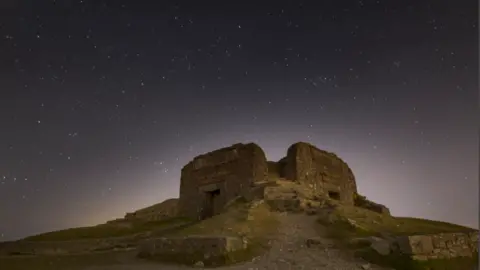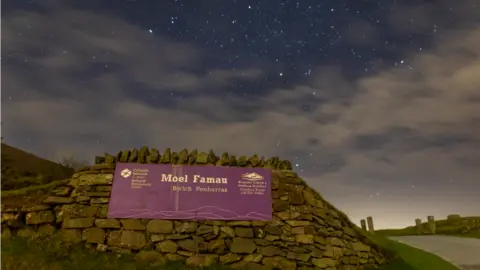Dark sky: Could Wales soon be home to four zones?
A swathe of the north-east Wales uplands could soon be recognised as a hotspot for gazing at the stars.
The Clwydian Range and Dee Valley Area of Outstanding Natural Beauty (AONB) plans to submit a bid for global recognition as a dark sky zone.
It would be the fourth area of Wales to be given a status by the International Dark Sky Association.
This week is the inaugural Welsh Dark Sky Week, with events across the country.
Ahead of a stargazing walk up Moel Famau, the highest peak in the Clwydian hills, AONB area manager David Shiel said the sky was a "really important part of the landscape itself".
"It's really, really important for the biodiversity within the AONB as well," he said.
"About 60% of our biodiversity depends upon darkness so we're just concerned that we take steps to preserve the quality of our night skies."
 Dylan Parry Evans
Dylan Parry EvansThe AONB, which straddles the counties of Denbighshire, Flintshire and Wrexham, is aiming to become a Dark Sky Community, one of a number of statuses handed out by the International Dark Sky Association.
It is given to areas that show "exceptional dedication to the preservation of the night sky through the implementation and enforcement of a quality outdoor lighting ordinance, dark sky education and citizen support of dark skies".
'We're really serious'
Both Snowdonia and the Brecon Beacons national parks are Dark Sky Reserves, while the Elan Valley estate in Powys has gained Dark Sky Park status.
"[There's] a lot of work going on to monitor the quality of our skies, getting lots of people out to do stargazing like this event and doing lots of work on improving external lighting across the AONB as well, to show that we're really serious about preserving our dark skies," Mr Shiel added.
Leading the trek up Moel Famau was astronomer and science lecturer Rob Jones, from Wrexham.
"The sky belongs to all of us," he said.
"You might look up and think of a story, while someone else might think of the cultural or scientific aspect of it.
 Dylan Parry Evans
Dylan Parry Evans"Everyone takes something different out of it, but when we come together to share these stories and this information, it's great."
Wales' four other AONBs are also aiming for eventual international recognition as dark sky zones, and several spots in areas such as the Cambrian Mountains, which cover parts of Powys, Ceredigion and Carmarthenshire, have been recognised on a UK level.
With the Clwydian Range's proximity to Deeside, Wrexham and the large conurbations of north-west England, some might cast doubt on its claims of pitch-black skies.
But astrophotographer Dylan Parry Evans said it was one of the "top places" in north Wales, and measures to tackle light pollution were necessary.
"Light pollution can stop me in my tracks, because I need the perfect dark sky to do my work," he said.
"The status, I suppose, guarantees the dark sky for future generations.
"Work's been going on to ensure there's less light pollution, and as this work goes on we'll ensure that in hundreds of years there's a dark sky to look up to."
